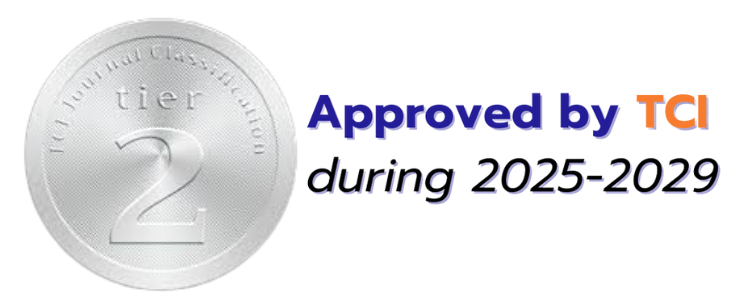Development of a Learning Model to Enhance Critical Thinking Skills in Animation Character Design for 3D Animation Course
Keywords:
Model for enhancing critical thinking skills, Critical thinking, Animation character design, 3DAbstract
The objectives of this research were 1) to analyze the factors that promote critical thinking skills in character design for 3D animation course, 2) to develop a model to enhance critical thinking skills in character design for 3D animation course, and 3) to evaluate the appropriateness of the developed model. A mixed-methods approach was employed, consisting of document analysis, interviews with five experts, and an evaluation using the Delphi technique with 17 specialists. The research instruments included interview forms, questionnaires, and model evaluation forms. Qualitative data were analyzed using content analysis, while quantitative data were analyzed using the median and interquartile range (IQR). The results revealed that: 1) 5 key factors were identified as follows: learning processes, instructor roles, media and technology, learning environment, and learner characteristics, with the highest level of appropriateness (Median 4.59–4.77, IQR 0.22–0.26), 2) the developed model to enhance critical thinking skills in character design for 3D animation course was evaluated as highly appropriate (Median 4.63–4.75, IQR 0.25–0.30), and 3) the overall evaluation by experts indicated that the model was highly appropriate (Median 4.45–4.85, IQR 0.53–0.69) The results reflect that this critical thinking enhancement model is appropriate and can be practically implemented.
Downloads
References
Chen, Y., Zhang, X., & Hu, L. (2024). A progressive prompt based image generative AI approach to promoting students’ achievement and perceptions in learning ancient Chinese poetry. Educational Technology & Society, 27(2), 284–305. https://doi.org/10.30191/ETS.202404_27(2).TP01
Gao, B. (2024). Research on the development of the deep integration of digital media technology and modern art education. Advances in Social Science, Education and Humanities Research, 545, 354–358. https://doi.org/10.2991/assehr.k.210331.066
Henderson, J. B., Marley, S., Wilcox, M. J., Nailor, N., Sowl, S., & Close, K. (2020). Challenges assessing the impact of project-based learning on critical thinking skills. Journal of Assessment and Institutional Effectiveness, 10(1–2), 33–60. https://doi.org/10.5325/jasseinsteffe.10.1 2.0033
Huang, N. N., Chang, Y.-S., & Chou, C.-H. (2020). Effects of creative thinking, psychomotor skills, and creative self efficacy on engineering design creativity. Thinking Skills and Creativity, 37, 100695. https://doi.org/10.1016/j.tsc.2020.100695
Kallick, B., & Zmuda, A. (2017). Students at the Center: Personalized Learning with Habits of Mind. ASCD.
Manalo, E. (2019). Introduction: Establishing a case for sharing research based instructional strategies. In Deeper learning, dialogic learning, and critical thinking: Research-based strategies for the classroom (pp. 1–13). Routledge.
Moustafa, A., & Al Rashaida, M. (2024). Fostering students’ critical thinking through the implementation of project-based learning. In R. M. Magsino (Ed.), Educational technology and critical thinking (pp. 62–78). IGI Global. https://doi.org/10.4018/979-8-3693-0880-6.ch004
Ozkan, Z. C. (2023). The effect of project-based learning in visual arts lessons on students’ outcomes and attitudes. International Journal on Social and Education Sciences, 5(2), 367–380. https://doi.org/10.46328/ijonses.565
Pujawan, I. G. N., Rediani, N. N., Antara, I. W. S., Putri, N. N. C. A., & Bayu, G. W. (2022). Revised Bloom taxonomy oriented learning activities to develop scientific literacy and creative thinking skills. Journal Pendidikan IPA Indonesia, 11(1), 47–60. https://doi.org/10.15294/jpii.v11i1.34628
Rovinelli, R. J., & Hambleton, R. K. (1976). On the use of content specialists in the assessment of criterion-referenced test item validity (Research Report No. 76-4). Paper presented at the Annual Meeting of the American Educational Research Association (AERA), San Francisco, CA. ERIC. https://eric.ed.gov/?id=ED121845
Wang, X., Hampton, J., Ritzhaupt, A. D., & Dawson, K. (2022). Trends and priorities of educational technology research: A Delphi study. Contemporary Educational Technology, 14(4), Article ep383. https://doi.org/10.30935/cedtech/12317
Downloads
Published
Issue
Section
License
Copyright (c) 2025 วารสารศาสตร์การศึกษาและการพัฒนามนุษย์

This work is licensed under a Creative Commons Attribution-NonCommercial-NoDerivatives 4.0 International License.







